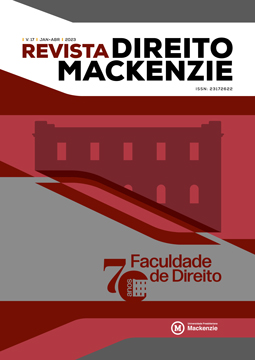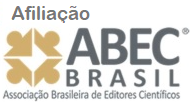FROM DILUTED CONSTITUTIONAL PROBLEMS ON THE NETWORK TO BUILDING A LEX META
Keywords:
Facebook, Plataforma, Lex meta, TransconstitucionalismoAbstract
The provision of services of the company Meta through its platforms has become increasingly complex, raising normative answers to legal problems that have multiplied due to this complexity. Under this scenario, this paper aims to answer how the platform deals with problems of (trans)constitutional nature and how the demand for legal formality and legal clarity in content moderations has turned the platform into a transnational legal order. To accomplish what is proposed, the method of approach used was deductive. By and large, the main conclusions point to the fact that, although there is no single legal order on the internet, there are several normative orders. Facebook is just one among many normative orders that deals with different dimensions of legal-constitutional problems such as the semantics of society or its systemic nature. With the creation of the Oversight Board, there is a tendence to have a center stage in the legal order, even though there might be widespread mistrust of the implementation of its legal autonomy.
References
ACCOUNTABLE TECH; MEDIA MATTERS FOR AMERICA. Keep Trump off Facebook [Campaign]. 2021. Disponível em: https://www.keeptrumpoffface book.com/facebooks-responses-are-worthless. Acesso em: 25 jun. 2021.
ALLAN, Richard. Hard Questions: Who should decide what is hate speech in an online global community? Facebook, 2017. Disponível em: https://about.fb. com/news/2017/06/hard-questions-hate-speech/. Acesso em: 20 maio 2021.
BICKERT, Monika. Publishing our internal enforcement guidelines and expanding our appeals process. Facebook, 2018. Disponível em: https://about. fb.com/news/2018/04/comprehensive-community-standards/. Acesso em: 15 jun. 2021.
BICKERT, Monika; HOFMANN, Jeanette; MIHR, Christian. Panel. In: FACEBOOK FORUM: COMMUNITY STANDARDS, 2018, Berlin. [Palestra]. Berlin: Humboldt Institute for Internet and Society, 2018. Disponível em: https:// www.hiig.de/en/ events/facebook-forum-community-standards/. Acesso em: 20 jun. 2021.
BRASIL. Decreto nº 592, de 6 de julho de 1992. Atos Internacionais. Pacto Internacional sobre Direitos Civis e Políticos. Promulgação. Brasília, DF: Presidência da República, 1992. Disponível em: http://www.planalto.gov.br/ ccivil_03/decreto/1990-1994/d0592.htm. Acesso em: 15 maio 2021.
BYGRAVE, Lee Andrew. Internet governance by contract. Oxford: Oxford University Press, 2015.
COMITÊ DE SUPERVISÃO. Estatuto do Comitê de Supervisão. [2019]. Disponível em: https://oversightboard.com/governance/. Acesso em: 20 jul. 2021.
COMITÊ DE SUPERVISÃO. FB-691QAMHJ: Decisão sobre o caso 2021-001-FB-FBR. 2021. Disponível em: https://www.oversightboard.com/decision/FB-691QAMHJ. Acesso em: 15 jun. 2021.
FACEBOOK. Oversight Board Trust. 2019. Disponível em: https://about.fb. com/wp-content/uploads/2019/12/Trust-Agreement.pdf. Acesso em: 20 jul. 2021.
FACEBOOK. Content restrictions based on local law. 2020a. Disponível em: https://transparency.fb.com/data/content-restrictions/?from=https%3A%2F%2 Ftransparency.facebook.com%2Fcontent-restrictions. Acesso em: 15 jun. 2021.
FACEBOOK. Termos de Serviço. 2020b. Disponível em: https://pt-br.face book.com/legal/terms. Acesso em: 15 nov. 2020.
FACEBOOK. Community Standards Enforcement Preliminary Report. 2021a. Disponível em: https://transparency.fb.com/data/community-standards-enforcement/?from=https%3A%2F%2Ftransparency.facebook.com%2Fcom munity-standards-enforcement. Acesso em: 10 set. 2021.
FACEBOOK. Política de Dados. 2021b. Disponível em: https://pt-br.facebook. com/policy.php. Acesso em: 25 mar. 2021.
FISCHER-LESCANO, Andreas; TEUBNER, Gunther. Regime-Kollisionen: Zur Fragmentierung des globalen Rechts. Frankfurt am Main: Suhrkamp, 2006.
HELDT, Amélie; DREYER, Stephan. Competent third parties and content moderation on platforms: potentials of independent decision-making bodies from a governance structure perspective. Journal of Information Policy, United States, v. 11, p. 266-300, 2021.
HOFFMANN-RIEM, Wolfgang. “Verhaltenssteuerung durch Algorithmen – eine Herausforderung für das Recht”. Archiv des oeffentlichen rechts, Tübingen, v. 142, n. 1, p. 1-42, Jan. 2017.
KARAVAS, Vaios; TEUBNER, Gunther. http://www.CompanyNameSucks.com: The horizontal effect of fundamental rights on private parties within autonomous internet law. Bepress Legal Series, Paper 23, 2003. p. 27-31.
KELLER, Clara Iglesias. Regulação Nacional de Serviços na Internet: exceção, legitimidade e o papel do Estado. Rio de Janeiro: Lumen Juris, 2019.
KLONICK, Kate. The Facebook Oversight Board: creating an independent institution to adjudicate online free expression. Yale Law Journal, v. 129, n. 2418, p. 2418-2499, Jun. 2020.
KÜHNL, Christina. Persönlichkeitsschutz 2.0: Profilbildung und -nutzung durch soziale Netzwerke am Beispiel von Facebook im Rechtsvergleich zwischen Deutschland und den USA. Berlin: de Gruyter, 2016. p. 21-22 (Schriften zum europäischen Urheber-, Immaterialgüter- und Informationsrecht, EurUR Band 12).
LADEUR, Karl-Heinz. Die Medienfreiheit im Netzwerk der Netzwerke. Neue Institutionen für neue Medien. Reihe PhiN. Philologie im Netz, Beihefte, v. 12, p. 4-25, 2017a.
LADEUR, Karl-Heinz. Die institutionelle Dimension der Grundrechte – das Beispiel der Meinungsfreiheit. Manuscrito, 2017b.
LUHMANN, Niklas. Das Recht der Gesellschaft. Frankfurt am Main: Suhrkamp, 1993.
LYONS, Tessa. Hard Questions: How Is Facebook’s fact-checking program working? Facebook, 2018. Disponível em: https://about.fb.com/news/2018/ 06/hard-questions-fact-checking/. Acesso em: 15 jun. 2021.
NEGÓCIO, Ramon. Da soberania jurídica à nacionalidade: da localização estatal à deslocalização esportiva. Revista Jurídica da FA7, Fortaleza, v. 18, n. 1, p. 155-168, jan./abr. 2021. Disponível em: https://periodicos.uni7.edu.br/ index.php/revistajuridica/article/view/1315. Acesso em: 20 jul. 2021.
NEVES, Marcelo. Transconstitucionalismo. São Paulo: Martins Fontes, 2009.
NEVES, Marcelo. Do diálogo entre as cortes supremas e a Corte Interamericana de Direitos Humanos ao transconstitucionalismo na América Latina. Revista de informação legislativa, v. 51, n. 201, p. 193-214, jan./mar. 2014. Disponível em: https://www12.senado.leg.br/ril/edicoes/51/201/ril_v51_n 201_p193.pdf. Acesso em: 25 maio 2021.
OERMANN, Markus. Rechts(durch)setzung durch Informationsintermediäre: Big Data als Entscheidungs- und Handlungsressource. In: HOFFMANN-RIEM, Wolfgang (ed.). Big Data: regulative Herausforderungen. Nomos: Baden-Baden, 2018. p. 145-155.
PARCHEN, Charles Emmanuel; FREITAS, Cinthia Obladen de Almendra; BAGGIO, Andreza Cristina. O poder de influência dos algoritmos no comportamento dos usuários em redes sociais e aplicativos. Revista Novos Estudos Jurídicos - Eletrônica, v. 26, n. 1, p. 312-329, jan./abr. 2021. DOI: 10.14210/nej.v26n1.p312-329. Disponível em: https://siaiap32.univali.br/seer/ index.php/nej/article/view/17587/10063. Acesso em: 16 maio 2021.
REUTER, Markus. Facebooks Löschregeln: „Asylanten raus“ ist erlaubt, „Muslime raus“ ist verboten. Netzpolitik, 2016. Disponível em: https://netz politik.org/2016/facebooks-loeschregeln-asylanten-raus-ist-erlaubt-christen-raus-ist-verboten/. Acesso em: 15 jun. 2021.
ROßNAGEL, Alexander. Modernisierung des Datenschutzrechts für eine Welt allgegenwärtiger Datenverarbeitung. Multimedia und Recht, München, v. 8, n. 2, p. 71-75, 2005.
VESTING, Thomas. Rechtstheorie: ein Studienbuch. München: C.H. Beck, 2015.
Downloads
Published
Issue
Section
License
Copyright (c) 2023 Ramon Negócio

This work is licensed under a Creative Commons Attribution 4.0 International License.
The copyright of the articles published in Mackenzie Law Review belongs to the authors, who grant Mackenzie Presbyterian University the rights of publication of the contents, and the assignment takes effect upon submission of the article, or work in similar form, to the electronic system of institutional publications. The journal reserves the right to make normative, orthographic, and grammatical alterations to the originals, with the aim of maintaining the cultured standard of the language, respecting, however, the style of the authors. The content reported and the opinions expressed by the authors of the articles are their exclusive responsibility.











